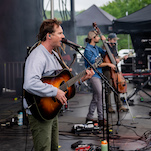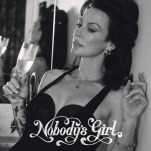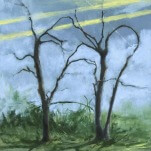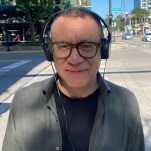“Go Home”: Growing Up Bi-Racial in America
Photo by Christopher Howard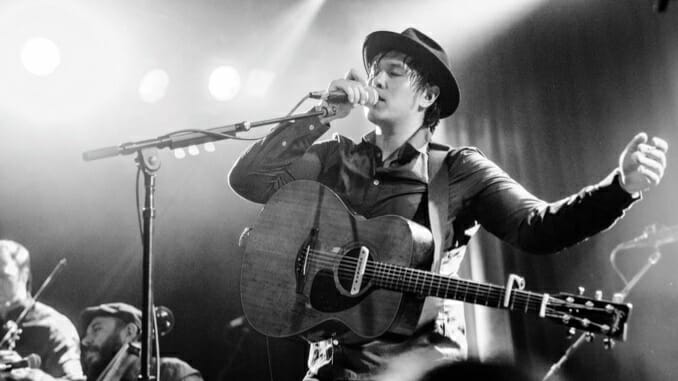
Editor’s Note: In light of the recent rise in anti-Asian hate crimes, we asked Liam McCormick for his reflections on racism in America. McCormick fronts the seven-piece San Francisco orchestral indie-rock band The Family Crest, who has released four EPs and three full-length albums, including 2018’s ‘The War: Act I.’ The War: Act II, the second installment in their musical concept series The War is slated for release this year.
“Go home.”
This is such a loaded and difficult statement to process. I was born in a very small town in rural California. Is this my home?
My mother is Chinese and was raised in the Sacramento Delta, a place where many Chinese settled. Is this my home?
Her mother was the first in her family born in America, and her father was the second generation born here. Their ancestors came from China. Is this my home?
My father is from a small town in California’s gold country, where my grandparents met and settled. Is this my home?
My father’s ancestors immigrated to America, five generations before me, from Ireland and England. Is this my home?

The Ow family, some of McCormick’s American ancestors
Just before I went to college I asked my grandfather to tell me more about my Chinese heritage and where I came from. We got in the car and he took me on a long drive around the Sacramento Delta to show me all the places he, my grandmother, my mom and my aunts grew up. At the time I felt disappointed. I didn’t feel like my question had been answered and I thought he’d misunderstood my intent or simply didn’t want to go into it. It took me years to realize that he, being the second generation in his family born in America, was showing me exactly what it meant to be Chinese-American. He had no idea what it was like in China. Sure, he grew up speaking Cantonese, eating traditional Chinese food and learning about Chinese culture from his family, but he also grew up drinking Coca-Cola, rooting for the 49ers, eating hamburgers and living within what is traditionally thought of as American culture. My grandfather may have been of Chinese heritage, but he was an American above all. He was born in America, he died in America, and when he was alive he was extremely proud to be an American. I am an American.
There are countless Asian people being verbally and physically assaulted, particularly over the course of the past year, that are American. Our country has consistently proven that a variety of cultures, ideas, and backgrounds allows us to advance further in music, film, technology, medicine, manufacturing—the list goes on and on.

The Ow family, including McCormick’s mother (far right)
Being biracial in America has a sad irony to it. Our country was founded and built by immigrants from various places, with various perspectives and ideas, which made us unique and special. As children, one of the first things we’re taught about our country’s history is that, “America is a melting pot.” It’s explained to us that people came here from all over the world in search of a better life and that it is our diversity that sets us apart from other nations. In many ways that makes me a visual and cultural representation of this country. In that way, I am America. And yet due to my almond-shaped eyes and my straight black hair, many don’t see me that way. Somehow in my own homeland, I am an outsider.
Racism comes in many different forms. Throughout my life I’ve generally been met with two different kinds of racism. The first I call “social racism.” This is a less hate-driven and more mocking kind of racism and includes things like someone stretching their eyes back or making stereotypical martial arts noises that they’ve observed in kung fu films. For many of my Asian friends, especially those who grew up in suburbs and cities, this is primarily what they’ve experienced.
The second manifestation is a more deliberate and attacking form of racism that I’ll call “hateful racism”. Hateful racism is when someone actively seeks you out, uses slurs like chink, gook, Jap, Ping, ching-chong, slants, flat face, etc., and in many cases, brings with it physical altercations. In my experience, until recently, hateful racism directed at me was most common in rural, primarily white communities, similar to the one in which I grew up. In the past few years and specifically in the wake of COVID-19, this has changed.

McCormick as a baby in rural California
My first experience of racism was when I was six years old. My sister and I were waiting in the car for my mother, who had made a quick stop at the grocery. We were minding our own business when a group of teenagers came up to the car. They tapped on the glass, pulled their eyes back toward their ears and started uttering, “Ching, Chong, Ping, Pong…” They made noises emulating the high-pitched sounds they’d seen in various martial-arts films while “karate chopping” the roof of our car, and as they escalated and began rocking the car, my mother came out of the store. Her first reaction was to move quickly and ignore the attackers (a common way many deal with threatening behavior), but even her presence didn’t hinder their taunting, and when she eventually politely asked them to leave us alone, they mocked her as well.
Mom got into the car, shaking her head and began to drive us home.
After a few minutes, she began to explain to us, her young children, what had just happened. Now, my mother is an extremely strong woman and though she did her best to calm herself, I noticed her eyes begin to well up. At the time, I thought that she was hurt by what they had done, but in retrospect, I think having to explain racism to a four- and six-year-old and how it would be a part of our lives forever was the real cause of her sadness. You see, we learn to develop thick skin over the years. We learn to bury these moments. But while we do our best to try to forget them, they build up and add to our shape. They are a part of us forever, and while we can bury them, the trauma always finds a way to surface.

It wasn’t until junior high that I would experience the brunt of racism and begin to understand it. There was a group of young boys that would constantly pick on me, and what started out as eye-stretching and racist slurs soon turned to a constant physical assault. I kept this a secret from everyone and did my best to ignore it. Later that year I learned that emasculation is a large focus of Asian male racism when a girl I was interested in began to tease me in tandem with her friend. At the time I knew she liked me, so I asked her why she was saying the things she was saying. I remember she looked ashamed, as her participation in the racism was in an effort to fit in with her friend. She didn’t say anything. Instead her friend spoke up and said it was because, “we’d never work because it was unnatural,” that we would “make ugly babies,” and that “Asians have small dicks.” After this, I began to see myself as unattractive and undesirable because of my Chinese features. I started to wish I was “normal”—which upon reflection I realized to me meant white.
By high school I’d heard every Asian joke in the book and would generally tell people spouting a racist joke at me that their joke was lame and I would feed them a better one. At the time I thought I was proving that I was more clever than they were, but in reality, I was giving them more ammunition to use these “jokes” on someone else. When someone would call me a gook, I’d tell them that I was actually a chink and that if they were going to be racist they should at least get their races right. One particular kid thought it would be funny to call out, “Hey, where’s my Chinese food?!” literally every time we saw each other. This happened at least three or four times a day for four years. Eventually, on the last day of school, I decided to go to the only Chinese restaurant in town to get him what he’d been asking for. This time, when he asked me his stupid question, I pointed at a table full of Chinese food.
I tried to use their jabs against them, but while it did detract from further insults, it became a staple in my way of dealing with racist comments. Like many, I just chose to do my best to ignore it. The funny thing about ignoring years of abuse and insults pertaining to who you are and where you belong is that it has a tendency to build up under the skin.

I have a metaphor I like to use when describing what social racism feels like. Imagine you’re sitting in the front row at a comedy show and the performer begins randomly calling on people to make fun of. You sit there, the anxiety building, hoping that they won’t call on you. Now imagine that happening regularly, but instead of being called on, you’re not sure if you’re going to get humiliated or hit in the back of the head for no reason. It’s always in the back of my head, and it’s a weight that most people of color in this country have to carry.
High school was also the first place I was ever told to “Go home.”
Throughout my life, those who have said this to me had no context for their comment other than my physical attributes, and many of them had no idea that my ancestry on American soil surpassed theirs. To them an American is white, and I wasn’t in the club. I’m what many refer to as a Hapa (a Hawaiian word that means half white and half Asian), and though I’m 50 percent white, I took on a lot of my mother’s Chinese traits. Because of this many white people just assume I’m 100 percent Asian. But when I’m around Asian people, they always know that I’m biracial. To make things even more complicated, some Asians are biased against my being mixed race, too. Many times I have felt that neither the white community nor the Chinese community wanted me.
I’m not “home” here in America, but I sure as hell wouldn’t be home in China. My experience with Chinese culture was limited and only came at the occasional family get-together or wedding. In a way, my knowledge regarding my Chinese heritage was limited to dim sum. I visited my Chinese-American grandparents a lot but, as they were second-generation Americans, they were very integrated into the American culture they’d been raised in.

Liam McCormick and Laura Bergmann photo by Kim Huynh
I’d be remiss if I didn’t mention that there is a cultural difference between being a first-generation Chinese American and a fifth-generation Chinese American. My grandparents and their parents lived in America during a time when hateful racism was far more accepted. My grandparents lived through WWII, which meant that they remember when the U.S. government came, removed their Japanese friends from their homes, placed them in internment camps, and in one way or another, took their land and property for their own. They remember their school bus being stopped and watching as the police systematically removed their childhood Japanese-American friends. They witnessed not only their friends’ fear and embarrassment, but a resurgence of anti-Asian hate crimes that focused on anyone that had so-called “slanting eyes” and black hair. The government may have been focusing their racist policies on the Japanese, but as I’ve heard my entire life, to white people “all Asians look the same.” This led many in the Chinese community to do everything they could to assimilate their children to make sure that there was no question that they were Americans.
Compared to my first-generation Asian-American friends, my Chinese culture was very different. I didn’t know what a tiger mom was until my wife, who is white and was raised in a more diverse community, explained it to me. I didn’t know that the number eight was auspicious. I didn’t know that you wear white to a funeral. There is so much about Chinese culture that I wish I knew and still don’t know. Over the years, it has always made me feel extremely self-conscious and in many ways separate from my Chinese friends, so being called out because I look Chinese is even more strange.
I knew I was a musician as early as sixth grade and really began to pursue it in high school. As I got older it quickly became clear to me that being Asian was most likely going to work against me if I attempted to pursue a career in the entertainment industry. The unfortunate fact is, there are very few leading Asian-American men in music and film and even fewer East Asian-looking men in music. When I mention this fact to people, I ask them to name five Asian men that front bands. Some can name a few, but usually, I’m met with a long pause and then, “Wow, I’ve never thought about that.” If you ask someone to name 10 white frontmen they can do it in a heartbeat. The worst part is that it’s so commonplace for Asians to not be in the picture that most people have never thought about it. In a way, we’re not even an afterthought—we don’t even exist. We’re ghosts.
Listen to The Family Crest perform at Paste Studio in Manhattan in 2017.
I can’t tell you how many times I’ve wondered if I’ve missed my shot, didn’t get to the next level or if I won’t go any further in my musical career simply because of the way I look. As the frontman of The Family Crest, the careers of my bandmates rise and fall with mine. It adds an extra layer of hurt to wonder if my Chinese appearance may hurt their careers as well. On one occasion I had a producer tell me that I was really talented, but if I wanted to give myself a better chance of success I should consider getting “corrective eye surgery,” to round out my eyes a bit. They sincerely thought they were giving me good advice and in no way saw their comment as carrying any kind of systemic racism. I’ve had people at shows think one of my band members was me only to look disappointed when they find out that Liam McCormick is an Asian-American man. I’ve even had a few people pull their eyes back to squint their eyes at me from the crowd.
Countless people make racist jokes/comments on my band’s YouTube videos to the likes of, “but, he’s Asian… awkward,” “Am I the only one hiding back the laughter when the lead singer makes the most stereotypical ‘looney-tunes’ Asian when he squints his eyes and his pearly whites are in full force,” and “I miss the good old days when we were racist against Orientals… nowadays it’s all about the Arabs and the Jews.” Most of these comments have been deleted over time, but in the end it doesn’t matter. They just keep coming.
One particularly painful jab came with one of the proudest moments in my career. In 2015 my band was invited to play an NPR Tiny Desk concert while on tour. The day before the show I got extremely sick, and had to cancel a show. The following morning I arrived at NPR with a massive sinus infection and a high temperature. Bob Boilen and the NPR staff were incredibly warm and welcoming, and really gave me the confidence I needed to put on a good show. Still, we’re all our own worst critics, and I was extremely self-conscious about my performance. On the day the video came out I watched it and, to my surprise, despite my illness, I didn’t sound too bad.
Then I did what no one should ever do: I read the comments.

It wasn’t the occasional dislike or troll that phased me. I learned a long time ago that people won’t all like what you put into the world and everyone is entitled to their opinion. It was when I saw, “Turning Japanese I think I’m turning Japanese,” that my heart sunk. It wasn’t that the comment was particularly hurtful. It was knowing that after watching a video of my performance, instead of criticizing the content, once again someone decided to make fun of my race. Even here, people felt entitled to make racist jokes.
That’s the worst part of racism to me. It makes many of us consciously or subconsciously carry feelings of shame and inadequacy about our race. It makes us wish we could just live our lives in peace and find success in the areas in which we excel—to know that we were given the same opportunities as our white counterparts and will be judged by who we are and what we produce without our eyes or skin color coming into play. Is it possible that I could not achieve the success I hope for in music simply because it’s a tough industry? Absolutely. Do my concerns about my race playing a negative role in my career hold water?
Absolutely.
It’s the constant questioning that hurts. It’s the fact that even though I’m just as much of an American as all of the people that have told me to go home over the years, the way I look plays a role in everything: from my emotional health, to my profession, to my physical safety.
It’s having to monitor the Southern Poverty Law Center’s Hate Map while on tour with my band to make sure that, next time, we don’t accidentally stop at a gas station where the woman at the counter with SS tattoos gives you a look that says, “You better get out now while you still can.” Trust me, I know that look.
It’s worrying about my white wife being called a “race traitor” and potentially being physically hurt for just loving me, because for some reason our interracial marriage is offensive to some people, some 54 years after Loving v. Virginia.
It’s worrying about my mother living in a rural area of California and not knowing whether the neighbor who flies Confederate flags (though not from the South) and owns an arsenal of weapons might decide one day that he needs to make a statement.
It’s being followed by a truck for 30 minutes in my own hometown and having four grown men follow me into the store calling me chink, gook, and yellow man.
It’s having to be on alert all the time because someone who blames Asians for the pandemic might attack from behind.
It’s coming to the realization that Dragon: The Bruce Lee Story was your favorite childhood movie because the lead actor was one of the only people that you’d ever seen on the screen that not only looked like you, but was playing a truly relatable character.
It’s understanding the pain of the Black community that just wants to live their lives in equal peace.
It’s watching people yell at Mexicans and people from the Middle East to “Go home” and understanding their pain all too well.
It’s being emasculated as a man and watching Asian women friends and family be fetishized.
It’s having to put up with various girlfriends’ parents making racist Asian jokes to you and deciding that laughing it off is the best response as to not cause any problems.
It’s being the first and last person of color that she’s ever been with.
It’s dreading the day that you have to have “the racism talk” with your children and in one fell swoop take some of their innocence from them.
It’s knowing your parents had to go through that same conversation with you.
It’s the feeling of not being more than a pair of eyes.

The Family Crest photo by Keith Stein
A few days ago I was asked by a friend if and how we can “solve” racism. There are a seemingly infinite number of reforms that need to happen, but over the years I’ve come to believe that it starts with how we educate our youth. As American children, we grow up hearing the phrase, “America is a melting pot,” because “America has embraced people of various colors and creeds throughout our history.” We’re told that, “Americans have always seen strength through diversity,” and that, “Our country was built on our ability to work together.” And yet in spite of this we’re primarily taught the history of the white figures that built America. This immediately establishes a white-supremacist narrative that undermines the very values of pluralism we’re told America cherishes!
By not including people of color in the American story we’re teaching our children false history. We’re teaching them that anyone living in America that isn’t white isn’t “normal.” This immediately “others” any child of color through a subconscious lens of white supremacy and creates the “Go home” narrative. It teaches every child, regardless of their ethnicity, that people of color are, at best, a sub-genre of American. Why am I an Asian-American when my white friends and counterparts are simply American? If children aren’t educated about an America that includes the people of color who also shaped and built the country, how are they supposed to naturally see people of color as truly American?
Just like my British-Irish ancestors, my Asian ancestors have been American-born citizens for more than 150 years. During that time they lived through WWI, the Great Depression, WWII, the Civil Rights Movement, Vietnam, the War on Terror, the massive worldwide change in society resulting from the invention of the internet, and countless other historical events both major and minor. During every one of these monumental changes that shook our society and turned the wheels of history, Asian-Americans were there—working, leading, making a difference. Though our contributions often go unacknowledged, we aren’t just observing American history. We are American history.
Right now the Asian American community is exhausted. We’ve kept our heads down and our mouths shut for a long time in the hope that people would eventually see us as equals. We’ve done our best not to stir the pot. We’ve worked with our fellow Americans to build this country, much of the time while being looked down upon and mocked by our white neighbors.
Chinese-Americans built the railroads that connected America, worked in the fields, fueled the economy, started from the bottom, became doctors, lawyers, teachers, musicians and every other job you can imagine an American can hold. We did this in spite of being murdered, being forced to form communities (Chinatowns) within our cities to protect ourselves from violence and being the first race legally banned from entering the United States. In spite of all the ways we’ve made our country better, we’re still being beaten up in the streets and told to “Go home.”
It’s America’s turn to stand up for us. We need support in stopping the cycle of racism that exists today. It’s not hard to do. If you find yourself making an Asian joke, just stop. If you’re about to pull your eyes back or make martial-arts-film noises, stop. If your child is doing it, explain to them that it’s hurtful and wrong. If your friend or someone you know is doing it, though it may feel awkward or hard, ask them politely to stop. If you see someone picking on an Asian person, stand with the Asian person. If you have an Asian friend, tell them that you’re there for them if they need you.
We just want you to stand with us. We want an equal seat at the table. We just want to feel safe in our homes. In the end, we simply want—and deserve— what all Americans want: life, liberty, and the pursuit of happiness.
